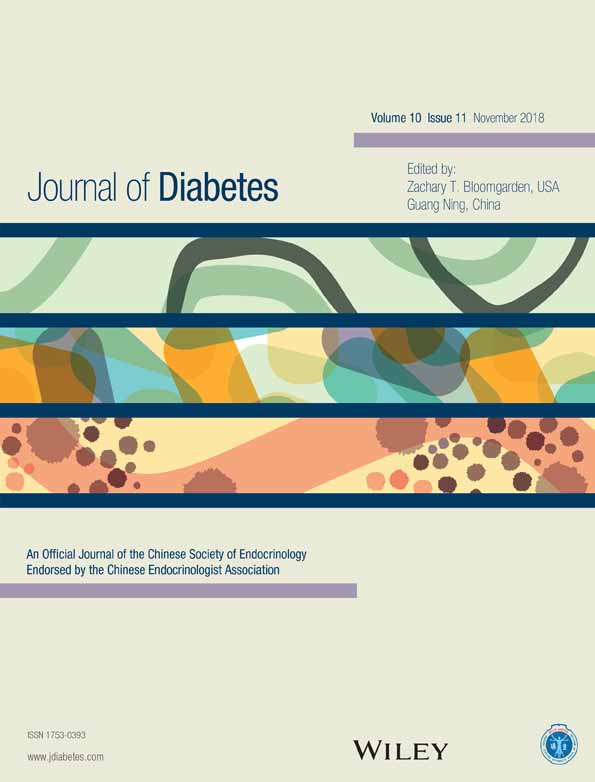Human herpesvirus 8 infection DNA positivity is associated with low insulin secretion: A case-control study in a sub-Saharan African population with diabetes
感染8型人类疱疹病毒后的DNA阳性与低胰岛素分泌相关:一项对撒哈拉沙漠以南的非洲糖尿病患者的病例对照研究
Abstract
enBackground
Viruses have been considered potential triggers for the development of diabetes. This study assessed insulin secretion and insulin sensitivity in human herpesvirus 8 (HHV8)-infected and uninfected sub-Saharan African people with diabetes.
Methods
In all, 173 people with non-autoimmune diabetes were enrolled consecutively: 124 with type 2 diabetes mellitus (T2DM) and 49 with ketosis-prone diabetes (KPD) admitted in hyperglycemic crisis. Those with KPD were further subdivided into those with new-onset ketotic-phase KPD (n = 34) or non-ketotic phase KPD (n = 15). All participants were screened for HHV8-specific antibodies and genomic DNA. Blood samples were collected for analysis of fasting glucose, HbA1c, lipid profile, and C-peptide, with insulin resistance and secretion estimated by homeostasis model assessment.
Results
Among the 173 diabetic participants, 88 (50.9%) were positive for HHV8 antibodies (Ac-HHV8+), including 15 (8.7%) positive for HHV8 DNA (DNA-HHV8+). The seroprevalence of HHV8 was similar between T2DM (55.6%) and KPD (61.2%) subjects. Of those with and without ketotic-phase KPD, 35.3% and 46.7% were Ac-HHV8+, respectively. Body mass index was significantly in lower DNA-HHV8+ than DNA-HHV8– subjects. Low-density lipoprotein and total cholesterol were significantly higher, but C-peptide and homeostatic model assessment of β-cell function (HOMA-β) were significantly lower in DNA-HHV8+ than DNA-HHV8– participants. After excluding DNA-HHV8+ participants, triglyceride concentrations were significantly higher in Ac-HHV8+ (n = 73) than Ac-HHV8– (n = 85) subjects. In contrast, HOMA-β was significantly higher among Ac-HHV8+ than Ac-HHV8– participants.
Conclusions
In the present study, HHV8 DNA positivity was associated with low insulin secretion in this sub-Saharan African diabetes population.
Abstract
zh摘要
背景
目前病毒被认为是诱导糖尿病发生的潜在病因。本研究在感染及未感染8型人类疱疹病毒(human herpesvirus 8,HHV8)的撒哈拉沙漠以南的非洲糖尿病患者中对胰岛素分泌以及胰岛素敏感性进行了评估。
方法
本研究连续纳入了共173名非自身免疫性糖尿病患者:其中124名为2型糖尿病(T2DM),49名为酮症倾向性糖尿病(ketosisprone diabete,KPD;根据高血糖危象确诊)。KPD患者又被进一步细分为新发病的酮症期KPD(n = 34)与非酮症期KPD(n = 15)。筛查所有参与者的HVH8-特异性抗体以及基因组DNA。收集血样分析空腹血糖、HbA1c、血脂谱以及C肽水平, 并使用稳态模型评估法评估胰岛素抵抗与胰岛素分泌。
结果
在173名糖尿病参与者中, 有88名(50.9%)患者的HHV8抗体阳性(Ac-HHV8+),其中包括15名(8.7%)HHV8 DNA阳性(DNA-HHV8+)患者。在T2DM(55.6%)与KPD(61.2%)受试者之间HHV8的血清阳性率相似。在合并以及不合并酮症期KPD的受试者中Ac-HHV8+分别为35.3%与46.7%。与DNA-HHV8-受试者相比,DNA-HHV8+受试者的体重指数显著更小。DNA-HHV8+受试者与DNA-HHV8-受试者相比, 低密度脂蛋白以及总胆固醇水平都显著更高, 但是C肽水平以及使用稳态模型评估的β细胞功能(HOMA-β)却显著更低。将DNA-HHV8+受试者排除之后,Ac-HHV8+受试者(n = 73)与Ac-HHV8-(n = 85)受试者相比甘油三酯水平显著更高。相反,Ac-HHV8+受试者与Ac-HHV8-受试者相比HOMA-β显著更高。
结论
在本研究中, 撒哈拉沙漠以南非洲糖尿病人群的HHV8 DNA阳性与低胰岛素分泌相关。




